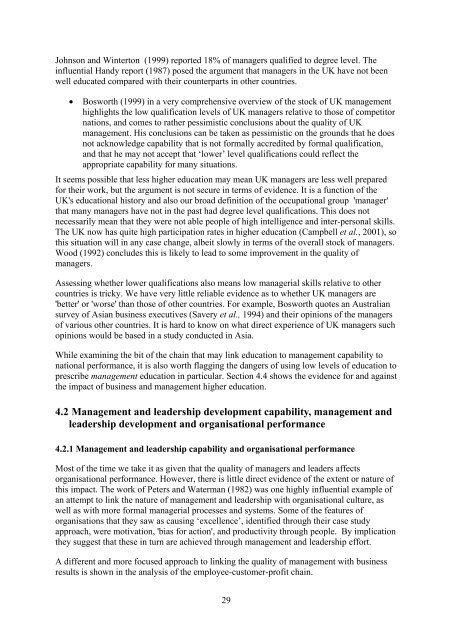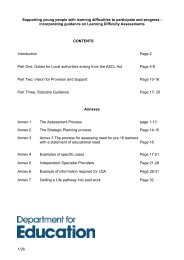The Development of Management and Leadership Capability and its ...
The Development of Management and Leadership Capability and its ...
The Development of Management and Leadership Capability and its ...
You also want an ePaper? Increase the reach of your titles
YUMPU automatically turns print PDFs into web optimized ePapers that Google loves.
Johnson <strong>and</strong> Winterton (1999) reported 18% <strong>of</strong> managers qualified to degree level. <strong>The</strong><br />
influential H<strong>and</strong>y report (1987) posed the argument that managers in the UK have not been<br />
well educated compared with their counterparts in other countries.<br />
• Bosworth (1999) in a very comprehensive overview <strong>of</strong> the stock <strong>of</strong> UK management<br />
highlights the low qualification levels <strong>of</strong> UK managers relative to those <strong>of</strong> competitor<br />
nations, <strong>and</strong> comes to rather pessimistic conclusions about the quality <strong>of</strong> UK<br />
management. His conclusions can be taken as pessimistic on the grounds that he does<br />
not acknowledge capability that is not formally accredited by formal qualification,<br />
<strong>and</strong> that he may not accept that ‘lower’ level qualifications could reflect the<br />
appropriate capability for many situations.<br />
It seems possible that less higher education may mean UK managers are less well prepared<br />
for their work, but the argument is not secure in terms <strong>of</strong> evidence. It is a function <strong>of</strong> the<br />
UK's educational history <strong>and</strong> also our broad definition <strong>of</strong> the occupational group 'manager'<br />
that many managers have not in the past had degree level qualifications. This does not<br />
necessarily mean that they were not able people <strong>of</strong> high intelligence <strong>and</strong> inter-personal skills.<br />
<strong>The</strong> UK now has quite high participation rates in higher education (Campbell et al., 2001), so<br />
this situation will in any case change, albeit slowly in terms <strong>of</strong> the overall stock <strong>of</strong> managers.<br />
Wood (1992) concludes this is likely to lead to some improvement in the quality <strong>of</strong><br />
managers.<br />
Assessing whether lower qualifications also means low managerial skills relative to other<br />
countries is tricky. We have very little reliable evidence as to whether UK managers are<br />
'better' or 'worse' than those <strong>of</strong> other countries. For example, Bosworth quotes an Australian<br />
survey <strong>of</strong> Asian business executives (Savery et al., 1994) <strong>and</strong> their opinions <strong>of</strong> the managers<br />
<strong>of</strong> various other countries. It is hard to know on what direct experience <strong>of</strong> UK managers such<br />
opinions would be based in a study conducted in Asia.<br />
While examining the bit <strong>of</strong> the chain that may link education to management capability to<br />
national performance, it is also worth flagging the dangers <strong>of</strong> using low levels <strong>of</strong> education to<br />
prescribe management education in particular. Section 4.4 shows the evidence for <strong>and</strong> against<br />
the impact <strong>of</strong> business <strong>and</strong> management higher education.<br />
4.2 <strong>Management</strong> <strong>and</strong> leadership development capability, management <strong>and</strong><br />
leadership development <strong>and</strong> organisational performance<br />
4.2.1 <strong>Management</strong> <strong>and</strong> leadership capability <strong>and</strong> organisational performance<br />
Most <strong>of</strong> the time we take it as given that the quality <strong>of</strong> managers <strong>and</strong> leaders affects<br />
organisational performance. However, there is little direct evidence <strong>of</strong> the extent or nature <strong>of</strong><br />
this impact. <strong>The</strong> work <strong>of</strong> Peters <strong>and</strong> Waterman (1982) was one highly influential example <strong>of</strong><br />
an attempt to link the nature <strong>of</strong> management <strong>and</strong> leadership with organisational culture, as<br />
well as with more formal managerial processes <strong>and</strong> systems. Some <strong>of</strong> the features <strong>of</strong><br />
organisations that they saw as causing ‘excellence’, identified through their case study<br />
approach, were motivation, 'bias for action', <strong>and</strong> productivity through people. By implication<br />
they suggest that these in turn are achieved through management <strong>and</strong> leadership effort.<br />
A different <strong>and</strong> more focused approach to linking the quality <strong>of</strong> management with business<br />
results is shown in the analysis <strong>of</strong> the employee-customer-pr<strong>of</strong>it chain.<br />
29
















